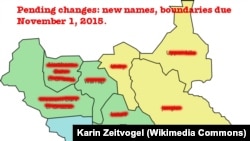South Sudan opposition politicians and legal experts on Monday questioned the legality of the order issued last week by President Salva Kiir to redraw the country's internal boundaries by increasing the number of states from 10 to 28.
"It's quite clear in the constitution that any changes to state boundaries or to state names requires the Council of States, which is one house in the South Sudan parliament, to act. Such decisions cannot be made through an executive order," David Deng, the research director at the South Sudan Law Society, told South Sudan in Focus.
"Any president has the authority to issue executive orders, but according to the constitution, such executive orders cannot be used to change state boundaries or on issues pertaining to decentralization," Deng said.
President Kiir issued a decree on Friday creating 28 new states. He insisted his decision was guided by South Sudan’s transitional constitution and aimed at promoting a federal system of government.
It's clear in the constitution that changes to state boundaries or state names requires the Council of States, which is one house in the South Sudan parliament, to act. Such decisions cannot be made through an executive order.David Deng, South Sudan Law Society
Mr. Kiir cited several clauses in the constitution to back up his order, including one that calls for "the promotion of democratic principles and political pluralism guided by the principles of decentralization and devolution of power" and others that empower the president to oversee executive institutions and amend the constitution.
'Egregious violation of constitution'
Lawrence Korbandy, a senior legal advisor to President Kiir, insisted the presidential order creating the new states does not violate the constitution and was a step toward a federal system of governance.
Government spokesman Michael Makuei said Mr. Kiir was "responding to "the will of the people" when he created the new states.
But Deng said that anyone "familiar with the constitution sees a pretty egregious violation" of it in what the president did on Friday.
Deng also rejected the assertion that Mr. Kiir's order would move South Sudan toward a federal system.
"The very thought of decentralizing through an executive order, which is itself a central decision, is really contrary to the decision of decentralization. It makes sense that you would not allow a president to decentralize through an act that further concentrates power in the center."
Deng also questioned President Kiir's commitment to the peace agreement he signed in August, to bring an end to 20 months of fighting in South Sudan.
"The peace agreement is founded on the principle of 10 states," he said.
"To change it just weeks after signing raises question of how committed the government is to following through on peace," Deng said.
Political opposition weighs in
Several leading opposition figures also questioned the legality of Mr. Kiir's order.
Lam Akol, the leader of the SPLM for Democratic Change and chair of the National Alliance umbrella group for opposition parties, said President Kiir’s order violates South Sudan’s transitional constitution, which clearly states that the National Assembly is involved in matters involving changes at the state level.
"If the president wants to change the boundaries of the states, the names of the states, their capitals and their number; this, according to article 162 of the constitution, should have been done by the national legislature," Akol said.
The minority leader in the National Assembly, Onyoti Adigo, called Mr Kiir's move "a complete violation of the constitution" because the president involved neither lawmakers nor the people in his decision.
The Secretary General of the South Sudan People’s Liberal Party, Isaac Natali Luis, said Mr. Kiir should be concentrating on fixing the social and economic problems in South Sudan, rather than redrawing internal boundaries.
Akol said creating new states would be a financial burden at a time when South Sudan’s economy is struggling. He also flatly rejected the government assertion that creating more states is a step toward federalism.
“Federalism is not the number of states. Federalism is the power that is given with each state. So let us not mix apples and oranges. He should just annul his order, he should just forget about it,” Akol said.
November deadline
Under the presidential order, the new states will officially be created in early November.
Central, Eastern and Western Equatoria states will be split into eight states; Northern and Western Bahr el Ghazal, Warrap and Lakes states will become 10 states; and the three states that currently make up the Greater Upper Nile region -- Jonglei, Unity and Upper Nile -- will be carved into 10 new states.
President Kiir will appoint the governors and state legislative assemblies in the new states.
The final clause of the order creating the new states says only President Kiir can amend the order -- by issuing a new order.
John Tanza contributed to this report from Washington, D.C.






